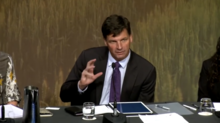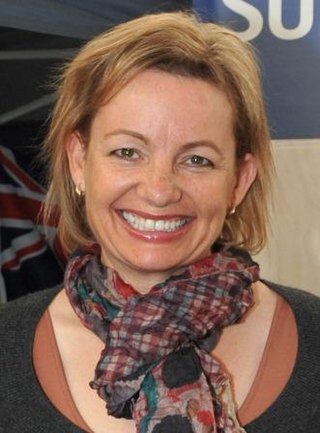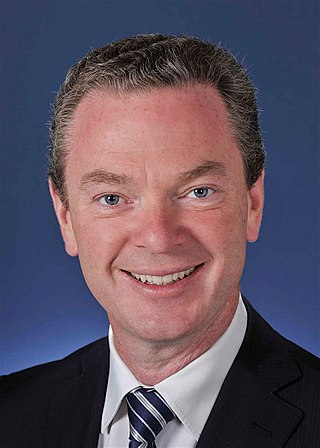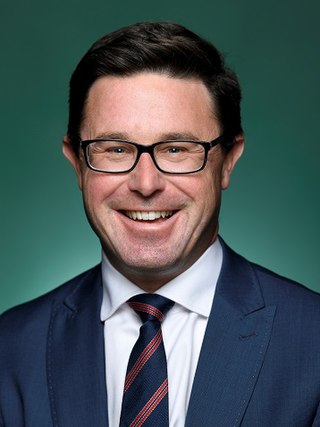This article has multiple issues. Please help improve it or discuss these issues on the talk page . (Learn how and when to remove these messages)
|
Angus Taylor | |
|---|---|
 | |
| Minister for Industry, Energy and Emissions Reduction | |
| In office 8 October 2021 –23 May 2022 | |
| Prime Minister | Scott Morrison |
| Preceded by | Himself (as Minister for Energy and Emissions Reduction) Christian Porter (as Minister for Industry,Science and Technology) |
| Succeeded by | Chris Bowen (as Minister for Climate Change and Energy) Ed Husic (as Minister for Industry and Science) |
| Minister for Energy and Emissions Reduction | |
| In office 29 May 2019 –8 October 2021 | |
| Prime Minister | Scott Morrison |
| Preceded by | Himself (as Minister for Energy) |
| Succeeded by | Himself (as Minister for Industry,Energy and Emissions Reduction) |
| Minister for Energy | |
| In office 28 August 2018 –29 May 2019 | |
| Prime Minister | Scott Morrison |
| Preceded by | Josh Frydenberg (as Minister for the Environment and Energy) |
| Succeeded by | Himself (as Minister for Energy and Emissions Reduction) |
| Minister for Law Enforcement and Cybersecurity | |
| In office 20 December 2017 –23 August 2018 | |
| Prime Minister | Malcolm Turnbull |
| Minister | Peter Dutton Scott Morrison (Acting) |
| Preceded by | Office established |
| Succeeded by | Office abolished |
| Assistant Minister for Cities and Digital Transformation | |
| In office 18 February 2016 –20 December 2017 | |
| Prime Minister | Malcolm Turnbull |
| Preceded by | Office established |
| Succeeded by | Michael Keenan |
| Member of the Australian Parliament for Hume | |
| Assumed office 7 September 2013 | |
| Preceded by | Alby Schultz |
| Personal details | |
| Born | 30 September 1966 Nimmitabel,New South Wales,Australia |
| Political party | Liberal |
| Spouse | Louise Clegg |
| Children | 4 [1] |
| Residence(s) | Goulburn,New South Wales [1] |
| Education | The King's School,Parramatta |
| Alma mater | University of Sydney New College,Oxford |
| Occupation | Politician |
Angus Taylor (born 30 September 1966) is an Australian politician. He has been a member of the House of Representatives since 2013,representing the seat of Hume for the Liberal Party. He has been shadow treasurer under Peter Dutton since 2022,having previously been a cabinet minister in the Morrison government from 2018 to 2022.
Contents
- Early life and education
- Business life
- Consulting and creation of Fonterra
- Agribusiness start ups
- Entering Parliament
- Nomination as candidate
- 2013 Australian federal election
- Rethinking the Renewable Energy Target
- Parliamentary work
- Local issues –mobile towers and water
- First Ministries
- Assistant Minister for Cities and Digital Transformation
- 2016 Australian federal election
- Minister for Law and Cybersecurity
- Minister for Energy
- Cabinet Minister
- 2019 federal election
- Minister for Energy and Emissions Reduction
- Strategic oil reserve
- Parliamentary controversy and media coverage
- Publications
- Personal life
- Notes
- References
Taylor was raised in country New South Wales. He graduated from the University of Sydney and New College,Oxford,attending the latter as a Rhodes Scholar. Prior to entering politics he worked as a management consultant and was active in agribusiness. Taylor was elected to parliament at the 2013 federal election. Taylor was made an assistant minister in the Turnbull government in 2015 and appointed Minister for Law Enforcement and Cybersecurity in 2017. He supported Peter Dutton in the 2018 Liberal leadership spills,and was subsequently elevated to cabinet after Scott Morrison defeated Dutton for the leadership. He held office as Minister for Energy (2018–2019),Energy and Emissions Reduction (2019–2021),and Industry,Energy and Emissions Reduction (2021–2022). He was appointed shadow treasurer after the Coalition's defeat at the 2022 election.
Taylor is a member of the National Right faction of the Liberal Party. [2] [3]



















